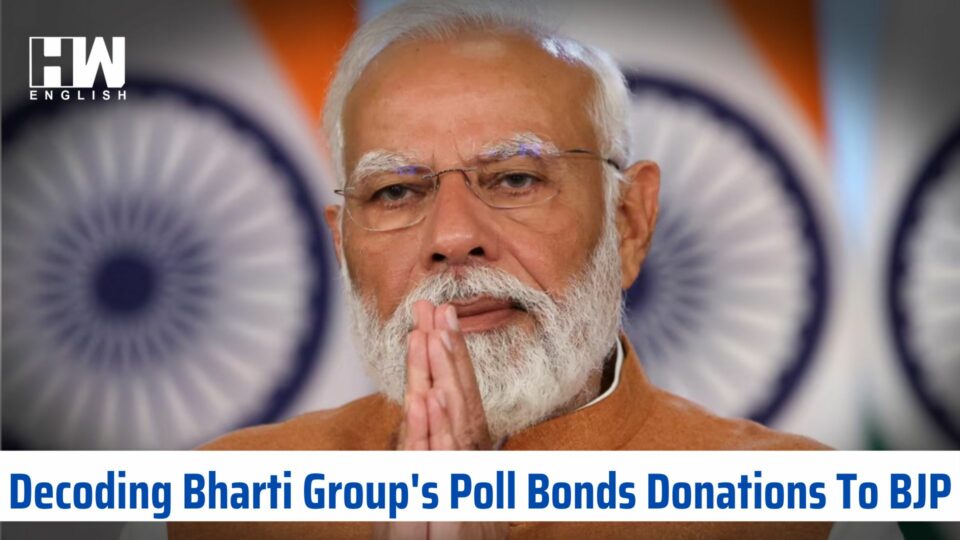Bharti Enterprises has made substantial contributions through electoral bonds, cementing its ties with the BJP. Between 2019 and 2024, Bharti group companies purchased electoral bonds worth Rs 247 crore, with over 95% of these funds directed toward the ruling party, the BJP, according to data released by the Election Commission.
The timing of these political contributions, particularly the surge to Rs 100 crore in 2023 coinciding with Eutelsat OneWeb’s broadband deal, raises pertinent questions about the connection between corporate interests and regulatory decisions.
The Modi government’s decision to bypass spectrum auctions for satellite allocation ignited controversy and allegations of favouritism. Despite the Supreme Court’s 2012 order mandating spectrum auctions after the 2G spectrum scam, the government opted for discretionary spectrum allotment similar to previous administrations cancelling 122 telecoms allotted by the Congress-led government.
In December 2023, Parliament hastily passed a new telecom law allowing administrative assignment of satellite spectrum, negating the need for competitive auctions. Simultaneously, the government sought judicial approval for this departure from auction norms.
OneWeb India’s parent company, Eutelsat OneWeb, is primarily owned by Bharti Enterprises, a major corporation with diverse interests that traces its roots back to an American entrepreneur’s satellite venture in 2012. Following a tumultuous journey that saw the company declare bankruptcy in 2020, it was eventually salvaged through a joint acquisition by Bharti Enterprises and the UK government for a hefty sum of US$1 billion.
The company’s readiness to deploy satellite broadband services pending final spectrum authorization coincided with revelations regarding significant political donations. Bharti Group made a Rs 150 crore contribution to the ruling Bharatiya Janata Party (BJP) through electoral bonds purchased before and after the introduction of the new law.
As per the News laundry reports, the involvement of international stakeholders, including the UK government, French satellite provider Eutelsat, and Japanese investment bank SoftBank in Eutelsat OneWeb, adds complexity to the situation. Transparency experts highlight potential legal implications under the UK Bribery Act if Eutelsat OneWeb were aware of Bharti’s political donations.
ALSO READ: Nirmala Sitharaman Declines Lok Sabha Contest Due To Funds
In 2023, as the government introduced the new Telecommunications Bill, companies like Reliance Jio and Vodafone India advocated for spectrum auctions, while others like Bharti, Amazon, and Starlink argued against them. Defending the Bill, Telecom Minister Ashwani Vaishnaw highlighted global practices of administrative spectrum allocation.
Bharti contended that auctioning satellite spectrum would unfairly favour certain stakeholders and could lead to hoarding. Conversely, Reliance Jio emphasized the importance of uniform and fair spectrum assignment rules, advocating for auctions to ensure a balanced competitive landscape.
With numerous opposition MPs suspended, the Bill was passed swiftly through both houses of Parliament and signed into law by the President. Concurrently, the government sought clarification from the Supreme Court regarding spectrum allocation through administrative processes.
On November 9, Bharti Airtel Limited reportedly purchased electoral bonds worth a staggering Rs 100 crore, promptly donating the entire sum to the Bharatiya Janata Party (BJP). Just four days later, on November 13, the BJP wasted no time in encashing all the bonds, raising eyebrows regarding the timing and magnitude of the transaction.
Subsequently, on November 21, amidst this political manoeuvring, OneWeb, now known as Eutelsat OneWeb, secured the coveted satellite authorization from India’s space regulator, becoming the sole entity qualified to acquire satellite spectrum from the government. This sequence of events has led to speculation about potential connections between political contributions and regulatory decisions.
As the new year dawned, Bharti Airtel Limited continued its political funding spree, purchasing an additional Rs 50 crore worth of electoral bonds, promptly encashed by the BJP on January 12. These transactions, occurring in close proximity to regulatory milestones, have raised questions about the integrity and independence of decision-making processes.
By November 2020, Bharti Global held a substantial 42% stake in the company, with a matching share held by the UK government. However, this ownership landscape underwent a significant transformation by June 2021, with the entry of French satellite service provider Eutelsat and Japanese multinational company SoftBank.
In September 2023, Eutelsat and OneWeb merged to consolidate operations and streamline branding, culminating in the formation of Eutelsat OneWeb. Despite this reorganization, Bharti Enterprises remains the largest shareholder in the newly formed entity, holding a commanding 23.8% stake.
This complex ownership structure raises concerns about accountability and potential conflicts of interest. Kush Amin, a Legal Specialist at Transparency International, underscores the liability potentially faced by Eutelsat if evidence emerges linking them to Bharti’s political donations.
Bharti Enterprises has utilized multiple avenues to channel funds to political parties, including electoral bonds and electoral trusts. The establishment of the Prudent Electoral Trust in 2013, spearheaded by the Bharti group, emerged as a significant channel for political contributions.
Notably, the largest beneficiary of donations from the Prudent Electoral Trust has been the BJP. 2019, during a pivotal electoral cycle, Prudent donated a staggering Rs 218 crore to the ruling party, with Bharti contributing Rs 27.25 crore directly to the trust.
As an independent media platform, we do not take advertisements from governments and corporate houses. It is you, our readers, who have supported us on our journey to do honest and unbiased journalism. Please contribute, so that we can continue to do the same in future.

